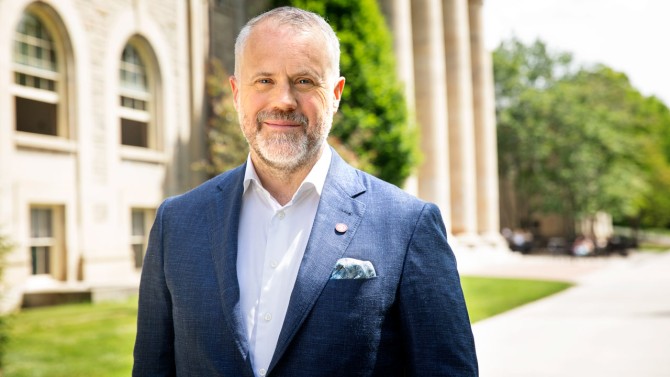Optimism that AI will make human jobs easier is lowest in the developed world, especially in the U.S., Canada, the United Kingdom, France and Australia.
That is one of several insights from Peter John Loewen, the Harold Tanner Dean of Arts and Sciences, who shared takeaways from his decade-long AI research on July 9, in "How Do Americans Think about AI?" The lecture in Warren Hall was the first of the Cornell University School of Continuing Education's Summer Events Series.
"This pattern shows up over and over again: That in parts of the developing world, there's more positivity about the effects of technology and artificial intelligence on the future and on life now than there is in the rich democratic West," Loewen told the more than 60 attendees.
He described how he and colleagues saw this pattern in a survey of public attitudes about AI that included approximately 24,000 people, about 1,000 from each of 21 different countries across 12 different languages, representing a majority of the world's population.
In another study, from this spring, Loewen examined attitudes about offshoring jobs and AI, focusing on job and price changes. Study participants said they were most concerned about price changes and favored AI over offshoring - but that favor is more marked among Democrats, hinting at an emerging partisan divide, said Loewen, who is professor of government in the College of Arts and Sciences (A&S).
Loewen has spent a lot of time and effort working with government to figure out how AI can better be used within public service, he said. In a paper published last year in the Journal of Public Policy, he examined the reasons why people might or might not want AI in government services.
"One set of reasons has to do with fairness," Loewen said. "People recognize that humans are actually very arbitrary. We've got all sorts of biases, we get tired, we make bad decisions, we're not consistent, et cetera. And it is possible to design automated decision systems that don't have those biases or inconsistencies in them."
AI's greater efficiency is another reason, he said. It can work faster, save money and detect fraud, Loewen said. While the researchers found that those who are more conservative emphasize fairness over efficiency, those who are more liberal like using automation and algorithms to make government more fair.
"So as politicians try to build public consent for the use of artificial intelligence, they have to confront the reality that people have different sets of reasons for why they would support it," Loewen said.
But governments wanting to use AI face a number of obstacles, from people's innate resistance to change to their distrust of AI's ability to make moral judgments, he added.
In another study, Loewen said he and colleagues found that the way people think about artificial intelligence in the U.S. and other places maps onto many of the ways they already think about politics and the economy.
"People who think that artificial intelligence is more likely to substitute for their jobs are more likely to support policies that you can characterize as populist around immigration and around labor," said Loewen. In contrast, those who believe AI will complement and enhance their jobs think government should respond by increasing social spending, training workers for new careers and investing in education.
"Our main problems are not technological - they're sociological," Loewen said. "And that will give you a sense of why it's challenging to use artificial intelligence."
The Cornell SCE Summer Events Series, which is free and open to all, includes Wednesday lectures by prominent Cornellians and Friday concerts on the Ag Quad.
Linda B. Glaser is news and media relations manager for the College of Arts and Sciences.







